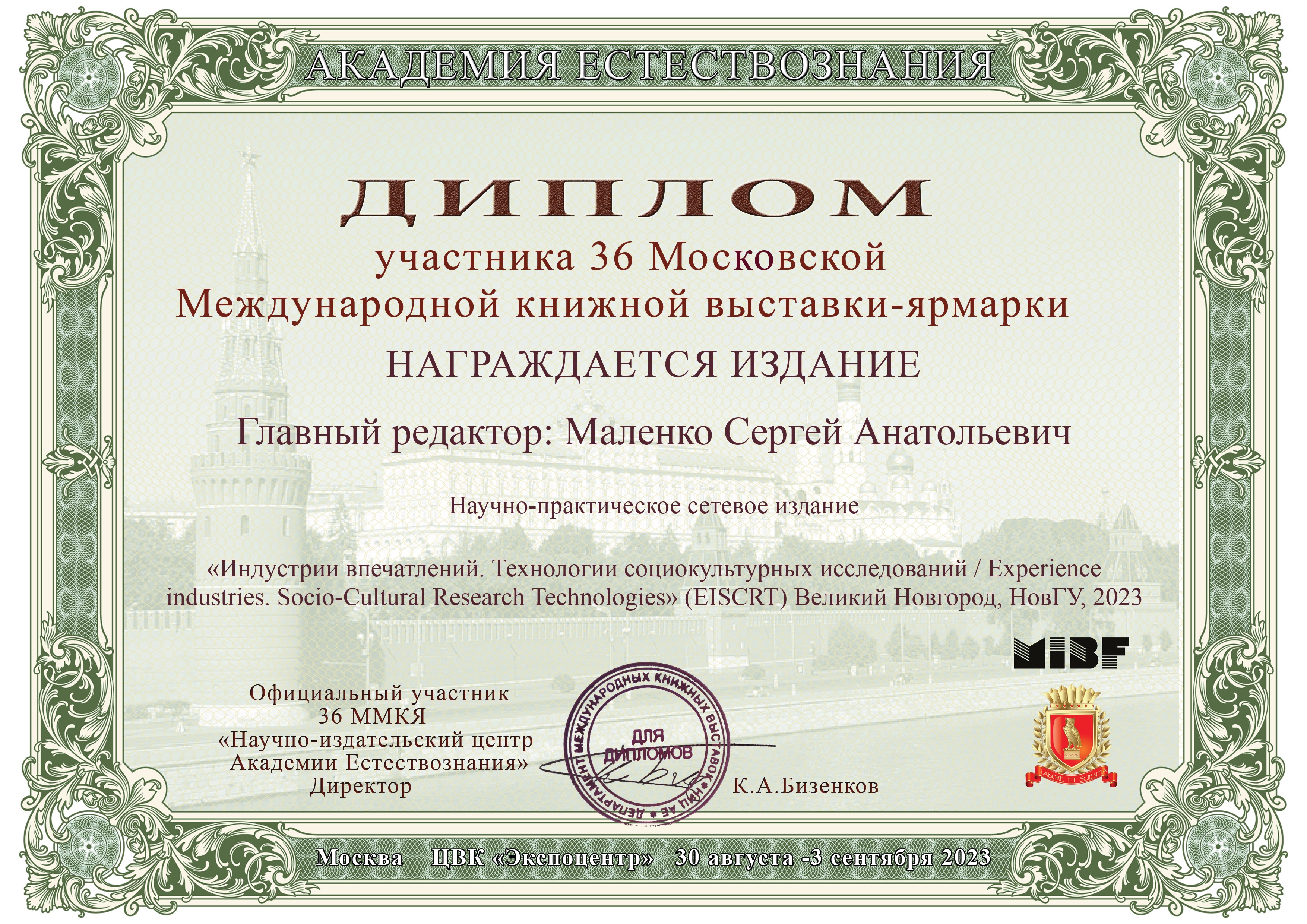EXPERIENCE INDUSTRIES: AVANT-GARDE OF TRANSFORMATIONS OF MEANINGS AND IMAGES IN DIGITAL CULTURE
DOI:
https://doi.org/10.34680/EISCRT-2025-3(12)-9-17Abstract
Dear readers!
You are starting to get acquainted with the third in 2025 issue of the scientific and practical online journal “Experience Industries. Socio-Cultural Research Technologies“ (EISCRT). In general, the issue is devoted to the analysis of the spectrum of artistic scenarios for constructing the public and the corresponding media topology, characteristic of the twentieth century that has passed away. At the same time, such studies are carried out by our respected authors precisely in the context of the transforming socio-cultural reality of the beginning of the new millennium.
The issue opens with the “Names” section, presented by an article by Novgorod researchers Sergey Devyatkin and Tatyana Kaminskaya. The authors, based on Guy Debord’s concept of “The Society of the Spectacle,” extrapolate it to the contemporary social context. They reasonably assert that the “society of the spectacle” is acquiring fundamentally new characteristics today, which only contribute to a significant aggravation of the social and anthropological contradictions traditional for postcolonial reality, especially in the context of the widespread dissemination of artificial intelligence.
Saratov colleagues Vasily Zadera and Ivan Suslov made a complex of ideological projections of Western cinema of the early 21st century, within the framework of which a spectrum of stereotypical ideas about the Soviet state, characteristic of the period of the "cold war", is persistently reproduced the object of their study. The authors systematize the mythological plots of Western European feature films, which visualize the persistent desire to position the West as an indisputable civilizational dominant, constantly subjected to attacks by “wild hordes” of Soviet spies and a “host” of barbarian emigrants.
Novgorod author Vladlen Makarov examines the artistic means of Japanese animated films, which consistently promote unique national and statist meanings in the space of modern mass culture. Based on the traditional principles of Japanese aesthetics, the scientist, through the analysis of images of nature, seeks to reveal the basic socio-cultural and anthropological values that are introduced and tested in the socialization models characteristic of Japanese culture.
The creative team from St. Petersburg consisting of Yegor Shemonaev and Pavel Lenkov also continues their research into Asian culture. The subject of their analysis is also the anime genre, but the angle of view shifts to identifying the reasons for its transformation into a real mainstream of modern cultural industries. The authors claim that such a transformation is achieved by introducing “eternal” themes into the anime plot, which originally reveal the existential needs of the younger generation.
The "Horizons" section is dedicated to identifying the features of the cultural transformation of civilization in the context of the rapid spread of digital technologies. The long-established and very successful tandem of Saratov authors, Denis Artamonov and Sofia Tikhonova, asks the question of whether a special identity can exist in the context of digitalization. In search of answers, the authors undertake an original analysis of traditional Russian cultural and philosophical plots to determine the nature of their transformation in the context of digitalization. At the same time, deep eschatological dramas are extremely bizarrely combined with the formidable theme of nuclear weapons. The researchers argue that the combination of traditional meanings and digital technologies will allow us to rethink global challenges in a new way and determine the unique place of Russian digital philosophy in the complex palette of modern spiritual quests.
Moscow authors Anastasia Gribova and Natalia Saenko offer their original view of digital media. They try to define their fundamental differences from traditional ones. It is significant that qualitative changes in the nature of information consumption, in their opinion, not only lead to the transformation of the media environment itself, but also determine profound changes in the cognitive and socio-cultural attitudes of man and society.
The "Horizons" section is completed by a study by Belgorod author Maria Sorokopud, who claims in her article that media are turning into powerful tools for influencing and managing attention in a digital society. This creates fundamentally new conditions for the aggravation of the repressiveness of mass culture, since it is being totally replaced by virtual images. It is in these conditions that only critical thinking becomes the fundamental basis for cultural and personal freedom.
The editors are confident that the original research presented in this issue will certainly become a new starting point for future large-scale research into the spectrum of current transformations of modern society and culture in the context of the impressive impact of experience industries on them.








